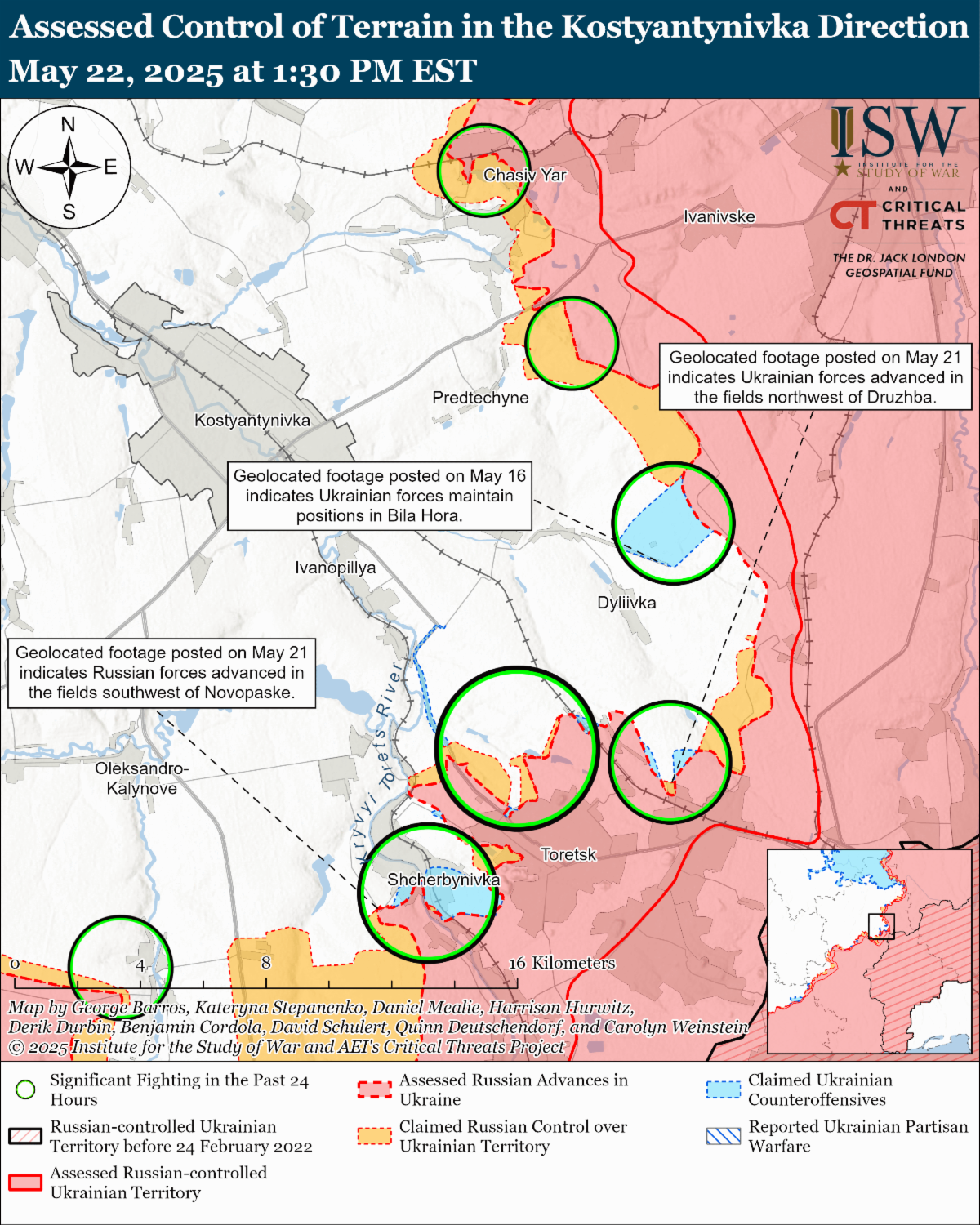Russian President Vladimir Putin is fostering the formation of an informal state ideology based on Russian nationalism that positions Russia in opposition to the West as part of ongoing efforts to militarize and unify Russian society. Putin stated on May 22 at a likely highly scripted award ceremony that "strong family foundations" and "traditional values" support Russia's "1,000-year-old statehood." Putin emphasized that Russia's "most important" task is to preserve its people, culture, and spirituality. A Russian Orthodox priest who received an award during the ceremony thanked Putin for protecting Russian traditional culture, spirituality, and language. The priest noted that Russia's celebrations of its contributions to victory in the Second World War teach Russian youth and those in the "Russkiy Mir" ("Russian World") to defend Russia and love Russia's culture and spiritual foundations. (The "Russian World" is a Kremlin-promoted geopolitical concept with amorphous parameters that broadly encompass those who live outside of Russia's borders but relate in some vague way to Russian language, culture, Orthodoxy, and media). Russian State Historical Museum General Director and awardee Alexei Levikin claimed that many countries hostile to Russia are basing their policies and ideologies on the falsification of historical events and facts. A martial arts school director who received an award claimed that Russia always proves that its fighters are the best on the battlefields and in sports arenas.
Russian Investigative Committee Head Alexander Bastrykin — one of the most outspoken Russian ultranationalists in Putin's inner circle — expressed support for the inclusion of an informal state ideology based on Russian nationalism in the Russian Constitution. Russian State Duma Deputy Speaker Pyotr Tolstoy stated on May 19 at the St. Petersburg International Legal Forum that Russia may change its constitution in the future. Duma Committee on State Building and Legislation Head Pavel Krasheninnikov later stated at the forum that the Russian Constitution "meets current realities" and does not need amending, however. Kremlin Spokesperson Dmitry Peskov stated on May 19, in response to Tolstoy, that changing the constitution is "not on the [Kremlin's] agenda." Bastrykin claimed in an interview with Kremlin newswire TASS published on May 22 that Russia is built on traditional values, such as patriotism, citizenship, service to the Fatherland, and a strong family, and that these traditional values should underpin Russia's "national idea." Bastrykin further claimed that Russia should enshrine this "national idea" in its constitution. Bastrykin emphasized Russia's need to protect and preserve its "historical heritage" through legal frameworks. Bastrykin routinely publicly expresses interest in an informal Russian state ideology predicated on Russian ethno-religious nationalism and opposition to the West, in contrast to other senior Russian officials. The Russian Constitution notably forbids the adoption of a formal state ideology. Peskov stated on May 22 that it is difficult to comment on proposals to amend the Russian Constitution because the Kremlin does not have the specifics of such proposals — a departure from his May 19 statement apparently dismissing changes to the constitution. Kremlin officials most recently leveraged Victory Day, Russia's largest holiday that commemorates the Soviet Union's contributions to the Second World War, to promote a new informal state ideology based on Russian unity in the face of opposition from the West. The Kremlin is likely accelerating its promotion of this ideology to prepare the domestic population for a future military conflict against the West. Bastrykin is likely spearheading efforts to formally enshrine Russian nationalist ideology in the constitution as one of the most powerful and influential ultranationalists within the Kremlin elite.
Key Takeaways:
- Russian President Vladimir Putin is fostering the formation of an informal state ideology based on Russian nationalism that positions Russia in opposition to the West as part of ongoing efforts to militarize and unify Russian society.
- Russian Investigative Committee Head Alexander Bastrykin — one of the most outspoken Russian ultranationalists in Putin's inner circle — expressed support for the inclusion of an informal state ideology based on Russian nationalism in the Russian Constitution.
- Russian authorities are renewing their years-long narrative rejecting the legality of the dissolution of the Soviet Union in 1991, possibly to deny Ukrainian and Belarusian sovereignty and independence in the future.
- Russian authorities and state media continue to publicly question the legitimacy of the Ukrainian negotiating team and the Ukrainian government, likely to further efforts to reject and delay negotiations and to set conditions to renege on any future peace agreement with Ukraine.
- Recent Western reporting provided additional details in a case in which Russian forces executed Ukrainian prisoners of war (POWs) in November 2024, supporting ISW's assessment that high-level Russian military commanders are likely involved in these executions.
- Russian Defense Minister Andrei Belousov confirmed on May 22 Colonel General Andrei Mordvichev's appointment as Russian Ground Forces Commander.
- Ukrainian forces recently advanced near Toretsk, and Russian forces recently advanced near Vovchansk, Toretsk, and Velyka Novosilka.
| 




 [ISW] 이란 업데이트, 2025년 5월 22일
[ISW] 이란 업데이트, 2025년 5월 22일
 [ISW] 러시아 점령 업데이트, 2025년 5월 22일
[ISW] 러시아 점령 업데이트, 2025년 5월 22일